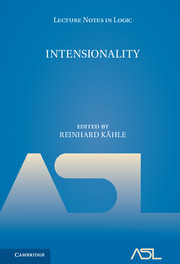Book contents
- Frontmatter
- Preface
- Contents
- The modal aether
- Possible worlds semantics for predicates
- A context principle
- The semantics of modal predicate logic II. Modal individuals revisited
- Intensionality and coercion
- Intensionality in philosophy andmetamathematics
- Representation theorem for models of dynamic intensional logic
- Intension, intention
- Modality, mood, and descriptions
- Coercion vs. indeterminacy in opaque verbs
- References
Intension, intention
Published online by Cambridge University Press: 30 March 2017
- Frontmatter
- Preface
- Contents
- The modal aether
- Possible worlds semantics for predicates
- A context principle
- The semantics of modal predicate logic II. Modal individuals revisited
- Intensionality and coercion
- Intensionality in philosophy andmetamathematics
- Representation theorem for models of dynamic intensional logic
- Intension, intention
- Modality, mood, and descriptions
- Coercion vs. indeterminacy in opaque verbs
- References
Summary
Abstract. Intensionality has generally been of more concern to logicians than intentionality. But also the latter merits their interest. This paper, a contribution to the logic of action, involves both concepts—the former implicitly, the latter explicitly.
Informal background. Many logicians and philosophers, the present writer included, are familiar with the term “intension” (with an s) but rather less familiar with the term “intention” (with a t). Outside philosophy and logic the situation is reverse: “intention” is used by all, “intension” by few, if any. A miniature history of the development of the two terms was given by E. J. Lemmon [6]:
The medieval term intentio was originally employed as a translation of the Arabic termma'na, a formin the soul identified with a meaning or a notion, and meant throughout medieval epistemology a natural sign in the soul. Later the Port Royal Logic distinguished between the comprehension and extension of a general term in something of the way in which Mill later distinguished connotation and denotation: whilst the extension is the set of things to which the term applies, its comprehension is the set of attributes which it implies. Sir William Hamilton replaced “comprehension” by “intension”, faultily spelling the word with an “s” by analogy with “extension”. Since then, the term “intentionality” has gone one way, via Brentano to Chisholm, and the word “intensionality” another via Carnap to Quine.
This elegant quotation is offered for what it is worth. It is of some help in explaining philosophers’ terminology, but unfortunately it leaves unexplained the connexion with everyday usage in the context of action. And it is the latter that is of concern in this paper.
We study a system in which one agent (“the agent”) operates in some environment (“the world”). The world may or may not be dynamic, in the sense that things can happen even if the agent does not do anything; when it is, it is convenient to postulate yet another agent, called “Nature”.
- Type
- Chapter
- Information
- Intensionality , pp. 174 - 186Publisher: Cambridge University PressPrint publication year: 2005



